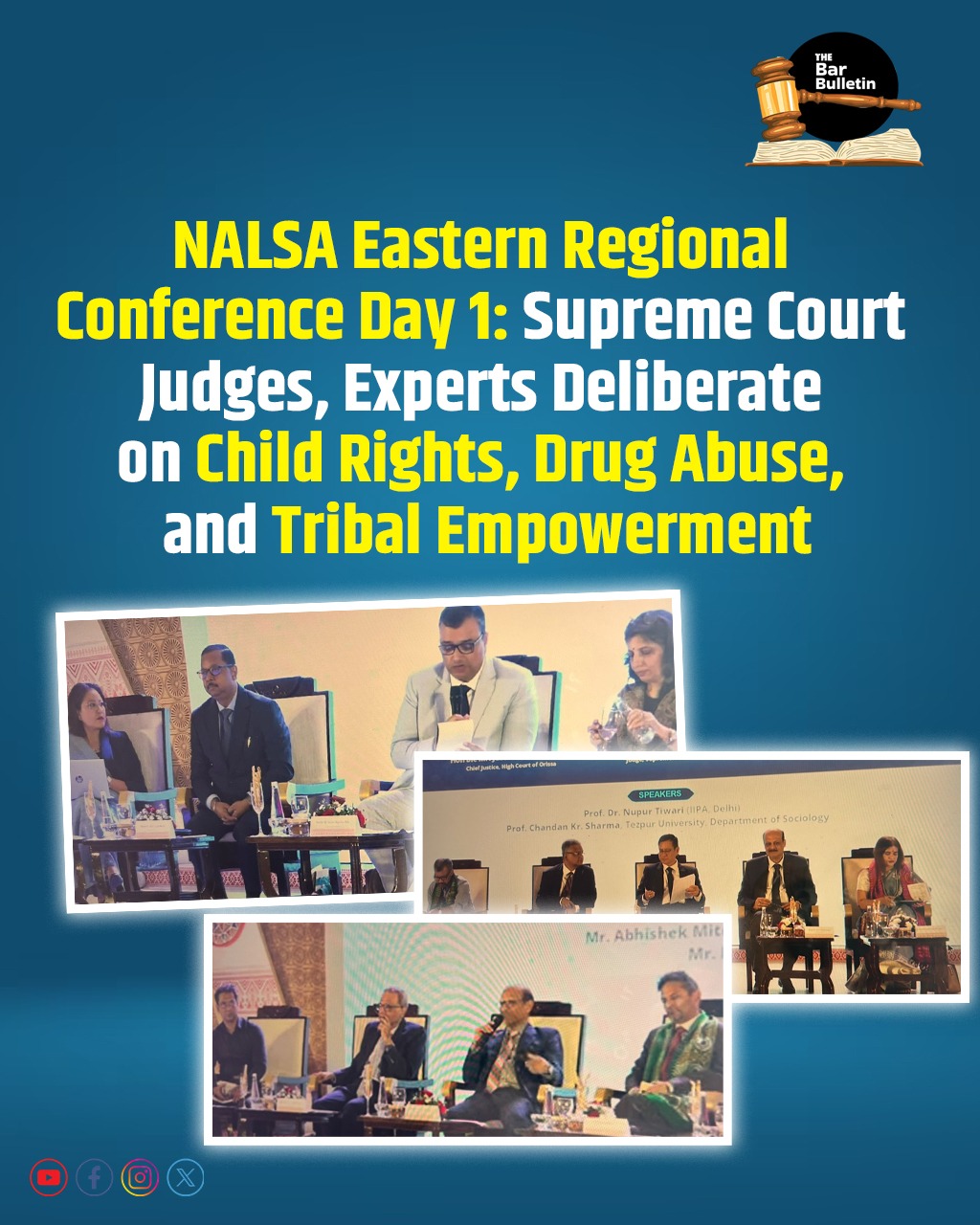The first day of the National Legal Services Authority (NALSA) Eastern Regional Conference, hosted by the Gauhati High Court and the Assam State Legal Services Authority (ASLSA) on October 11, 2025, convened a distinguished gathering of Supreme Court Judges, Chief Justices, academicians, and social reformers.
The conference addressed three pivotal themes shaping justice delivery in India’s eastern region, the prevention of child marriage and protection of child rights, combating the menace of narcotic drugs and psychotropic substances, and safeguarding the rights of tribal populations under the NALSA Samvad Scheme.
The East-Zone Regional Conference of the National Legal Services Authority (NALSA) was inaugurated on 11th October, 2025 in Guwahati by Hon’ble Mr. Justice Surya Kant, Executive Chairman, NALSA. The two-day conference is being jointly organised by the Assam State Legal Services Authority (SLSA) and the Gauhati High Court, under the patronage of Hon’ble Mr. Justice Ashutosh Kumar, Chief Justice, Gauhati High Court and Patron-in-Chief, Assam SLSA.
The inaugural ceremony was graced by the presence of Dr. Himanta Biswa Sarma, Hon’ble Chief Minister of Assam, Shri Arjun Ram Meghwal, Hon’ble Minister of State (Independent Charge) for Law & Justice, Government of India, along with esteemed Judges of the Supreme Court of India, and distinguished Chief Justices and Judges from various High Courts across the country.
Justice Michael Zothankhuma, Judge, Gauhati High Court & Executive Chairman, Assam SLSA delivered vote of thanks.
The Technical Sessions were chaired by Justice Dipankar Datta, Justice Ujjal Bhuyan, Justice Sandeep Mehta, Justice Joymalya Bagchi, Justice N. Kotiswar Singh, and co-chaired by Justice Harish Tandon and Justice M. Sundar, alongside eminent speakers including Dr. Kriti Bharti (Saarthi Trust, Rajasthan), Prof. Dr. Jyoti Dogra Sood (University of Delhi), Smti Mezivolu T. Therieh (Principal District & Sessions Judge, Kohima), Mr. Abhishek Mitra (Senior Joint Excise Commissioner, West Bengal), Mr. Rupin Sharma, IPS (DGP, Nagaland), Prof. Dr. Nupur Tiwari (Institute of Public Administration, Delhi), and Prof. Chandan Kr. Sharma (Tezpur University).
Session I: Prevention of Child Marriage and Protection of Child Rights
Justice Dipankar Datta inaugurated the session, noting that despite progressive legislation, child marriage remains a deep-rooted social challenge. He emphasized the need for community-driven interventions, urging State Legal Services Authorities to collaborate with local leaders, schools, and NGOs to develop preventive and rehabilitative mechanisms.
Justice Ujjal Bhuyan highlighted the interplay between the Prohibition of Child Marriage Act and the POCSO Act, cautioning against overly punitive approaches that may re-traumatize victims. He advocated for rehabilitation and empowerment alongside prosecution, stressing that “our role is not merely to punish, but to protect, educate, and empower.”
Dr. Kriti Bharti shared her frontline experiences in rescuing and annulling child marriages, underscoring that legal reform must be accompanied by social and economic rehabilitation.
Prof. Dr. Jyoti Dogra Sood examined legal gaps concerning the distinction between void and voidable marriages, calling for alignment with the Convention on the Rights of the Child (CRC).
Smti Mezivolu T. Therieh presented data from NFHS-5 and proposed an eight-pillar framework to counter child marriage through village monitoring committees, youth engagement, and fast-track courts.
Session II: Combating the Menace of Narcotic Drugs and Psychotropic Substances
Justice Sandeep Mehta described drug trafficking as a “silent epidemic eroding India’s social fabric,” emphasizing a balanced approach that combines strict enforcement with rehabilitation. He called for judicial discretion and evidence-based training for law enforcement to ensure humane and effective implementation of the NDPS Act.
Justice Joymalya Bagchi urged collective responsibility, observing that “even after 75 years of independence, children are not free from the chains of child marriage.” Applauding NALSA’s Standard Operating Procedure (SOP), he emphasized the threefold model of prevention, protection, and rehabilitation, noting that sustainable change requires education, poverty alleviation, and awareness rather than mere criminalization.
Mr. Abhishek Mitra and Mr. Rupin Sharma provided operational insights on enforcement under the NDPS Act, highlighting challenges such as cross-border trafficking, digital networks, and the need for community engagement in preventive strategies.
Session III: Protection of the Rights of Tribal Populations under the NALSA Samvad Scheme
Opening the session, Justice N. Kotiswar Singh emphasized that “empowerment without awareness is incomplete,” noting that the NALSA Samvad Scheme bridges the gap between law and community by bringing legal aid to the grassroots. He called for culturally sensitive, participatory frameworks that respect tribal autonomy while ensuring access to justice.
Justice Harish Tandon highlighted the importance of training paralegal volunteers and promoting legal literacy in local languages to foster trust and accessibility. “A well-trained paralegal is the bridge between constitutional promise and local reality,” he observed.
Justice M. Sundar discussed challenges in the Northeast from geographic isolation to documentation gaps and advocated for flexible, community-specific interventions with measurable outcomes.
Prof. Dr. Nupur Tiwari stressed participatory program design with tribal representation, while Prof. Chandan Kr. Sharma emphasized that traditional governance structures must complement, not compete with, formal legal mechanisms, calling for targeted efforts in land rights, legal literacy, and rehabilitation.
Conclusion
The discussions throughout Day 1 reaffirmed that justice must extend beyond courtrooms into the social fabric. From protecting children and combating addiction to empowering tribal communities, the sessions underscored NALSA’s mission to deliver inclusive, preventive, and participatory justice.
The conference concluded with a shared vision that access to justice must translate into dignity, empowerment, and protection for every vulnerable individual across the Northeast and beyond.

